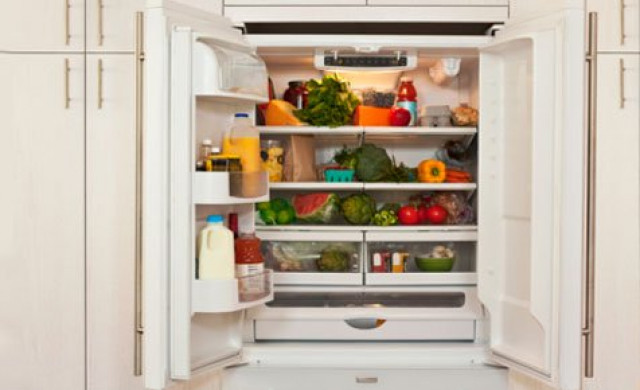9 things in your fridge you should throw away
Don't stock your fridge with these harmful products. Read on to know how you can minimize the risk to your health

Do you know what's lurking in your fridge?
PHOTO: 1800
Stocking things in your fridge for days on end is probably not a good idea. But it's not just the number of days you stock your groceries for, it's also what you stock. However, you needn't panic, we have compiled a list of foods from Men's Fitness and Kitchen Daily that can be a potential source of danger to your health and which you should probably throw out as soon as possible.
1. Re-refrigerating open tins of canned food

PHOTO: Deposit Photos
An opened can should never go back in the fridge, reason being that the metal transfers into the food giving it a metallic taste. You should also keep in mind that an open lid exposes the tin food to bacteria and open air of the fridge. So once you have opened the can, don’t place it back in the fridge, rather, take the food out and place it in a food container or a covered bowl.
Always for future reference remember that food high in tin concentration can cause fever, nausea and diarrhea.
2. Old leftovers

PHOTO: State Food Safe
We love to store leftovers, whether in plastic containers or plastic bags, but we can never seem to part ways with old food, ever. However, according to Food Safety, leftover food should not be stored for more than four days otherwise it paves way for food-borne illnesses and may leave you with an upset stomach, cause vomiting and diarrhea or worse, food poisoning.
3. Moldy fruit

PHOTO: UCR Today
Cutting off a moldy part of a fruit does not equate to saving the fruit from the mold. The mold penetrates deep below the food’s surface especially for soft fruits like berries, peaches and tomatoes. It’s always best to throw away any fruit which has mold growth on it because the mold produces spores and can contaminate other foods when stored in the fridge.
Better yet, consume your fruits within a day or two of purchase so that you don't have to throw them away when they become moldy.
4. Canned soup

PHOTO: Huffington Post
Choose fresh soup over canned soup. Always. A research by Harvard School of Public Health gathered that participants who had canned soup every day for five days had 1,221% higher BPA* levels in their urine as opposed to participants who had freshly made soup. This should be enough of an indication for you to steer clear of canned soup.
*BPA is a toxic chemical which is linked to obesity, liver damage and other health problems.
5. Processed meat

PHOTO: Telegraph
Deli slices seem healthy, but they’re packed with added salt and nitrates, which have been associated with a higher incidence of cancer; a 50 gram increased daily consumption of processed meat, such as cold cuts and sausage, is associated with a 19% increased risk of the disease in humans.
Next time ease up on the frozen foods section and opt for fresh chicken breasts and turkey meat instead.
6. Take-away leftovers that have been out for more than two hours

PHOTO: Safe Food
Restaurant leftovers are a treat the next day, however, take note, if leftovers have been left at room temperature for more than two hours, you are better off disposing them. This is because when food is left out for too long there is a higher risk of bacterial growth. So think twice before heading out after dinner with left overs in your car.
7. Margarine

PHOTO: Shanon's Kitchen
It’s good to be budget friendly but not at the cost of your health. Margarine is loaded with partially or fully hydrogenated fats which increase your “bad” LDL cholesterol, raising risk of heart disease and inflammation.
Our advice? Toss away your margarine and use coconut oil instead, it's a heart-healthy fat and improves cholesterol profiles, reduces inflammation, and revs metabolism.
8. Apple juice

PHOTO: Huffington Post
If your juice label says “juice drink”, leave it on the grocery shelf. Apple juice is one such example, although it sounds healthy, it is in fact packed with sugar and sweeteners. Steer clear of such drinks, try juicing fresh apples instead, they will be a reward for your body after a hard workout by keeping your blood flowing properly and helping you recover.
9. Avoid labels “Low-Fat”, “Fat-Free” or "Diet"

PHOTO: Health Talk Women
Warning! Such labels are a death trap, they tend to sound beneficial but are junk food in disguise. Products with these labels have sugar, artificial chemicals and processed products added with little to no nutrients. Throw them out if you’re guilty of stocking these devils!



















COMMENTS
Comments are moderated and generally will be posted if they are on-topic and not abusive.
For more information, please see our Comments FAQ